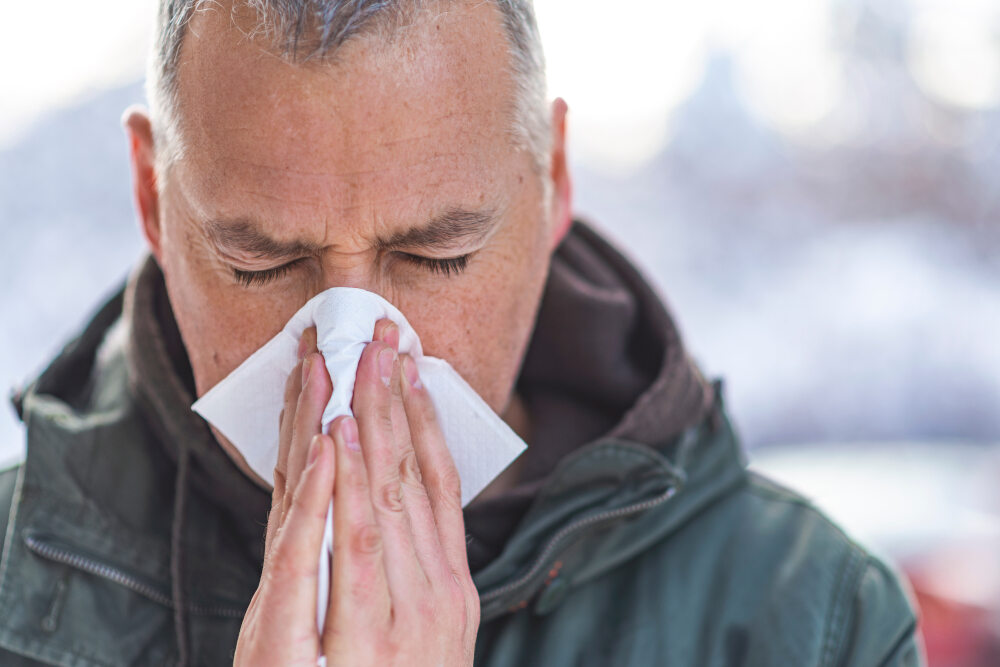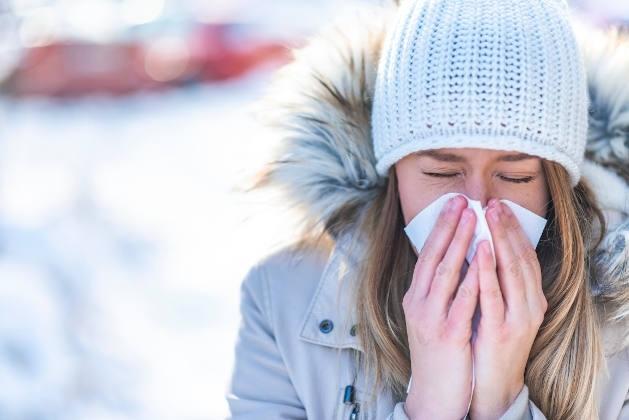What is Snow Mold?
Contrary to its name, the snow itself does not actually mold. Mold is often found when snow melts in the springtime and leaves a wet debris on decaying organic matter like leaves and grass—the damp and cool environment makes it ideal for fungus (mold) to breed.1
One of the easiest identifying features of snow mold is its cobweb-like appearance. In some cases, it also appears as round patches of dead grass that are white or bronze-pink in colour. Generally, snow mold disappears when the warmer weather arrives, and ground temperatures reach 20oC.2
Snow mold, along with other fungi that grow in a thawing, damp environment, often produce spores that are likely to kick up allergies; symptoms such as sneezing, a runny nose, and congestion are some common symptoms.3
How to Prevent Snow Mold?
The best way to prevent snow mold is to reduce its ability to thrive in your yard. Make sure to rake leaves in the fall to minimize dead organic matter as much as possible. Breaking down snowbanks can also reduce how much moisture is released as temperatures rise when the ground is still cool enough for mold to thrive.
Symptoms of Snow Mold Allergies
If you are allergic to mold, you will notice seasonal allergies that return just about every spring. Some years may be worse than others, depending on the temperature and weather. If you’re experiencing a chilly and wet spring, be prepared to gear up because snow mold is likely going to make an appearance. Some symptoms you can expect from snow mold allergies include: 4
- Sneezing
- Runny nose
- Congestion
- Itchy eyes
- Itchy nose, mouth, lips
- Watery eyes

How to Alleviate Snow Mold Allergy Symptoms
While ideally, we’d prevent the presence of mold altogether, there are times where stubborn spots in our yard will still breed fungi. When this happens and our allergies flare up, there are plenty of options to help alleviate your mold allergy symptoms.
Lifestyle Tweaks
When allergens are more aggressive, think about avoiding unnecessary trips outdoors, or shower ASAP once returning home. Making simple lifestyle changes like leaving dirty socks and shoes at the door, changing into loungewear at home, and drying clothes indoors and away from nature, can also help you avoid spores and mold particles from hanging on tight.
Take Antihistamines
Like the name suggests, antihistamines block the activity of histamines, the chemical responsible for triggering your allergy symptoms. So why miss out and wait for allergy season to be over when you can get some relief from over-the-counter (OTC) medications?
Reactine® Complete Sinus + Allergy can help alleviate symptoms such as sinus and nasal congestion, itchy eyes, water eyes, runny nose, and sneezing. For 24-hour relief, take 1 tablet of Reactine® Allergy Liquid Gels daily to alleviate itchy nose and throat, allergic skin itch and hives, and nasal congestion and stuffiness. This way, you can look forward to your favorite seasons year after year!
Rid Your Home of Allergens
It isn’t possible to get every allergen out of your home, but there are a lot of things you can do to help minimize them. An air purifier and allergen filter on your HVAC system can help reduce the particle circulation in your home. Certain vacuum cleaners also offer an allergy filter (High-Efficiency Particulate Air “HEPA” filter) that will trap smaller particles and avoid pushing dust and mold spores back into the air. An allergen cover for your mattress and pillowcase can also help prevent allergens from getting stuck in your bedding. Frequently washing sheets, curtains, carpets, rugs, and other soft surfaces can help as well, and don’t forget to dust those pesky areas like under your bed, between blinds and on top of bookcases.5
Improving Seasonal Allergies
Seasonal allergies can stick with you for a long time. You never know when you might develop a new allergy or when it might suddenly become a nonissue. When you are experiencing allergic reactions such as snow mold allergy, Reactine® can help alleviate your symptoms.
Don’t just try to power through—get some relief by blocking the activity of histamines. Reactine® offers relief from many allergens that may impact your quality of life.
If you are still unsure of your allergy symptoms or the dosage of OTC medications, always seek advice from a doctor or healthcare professional.

